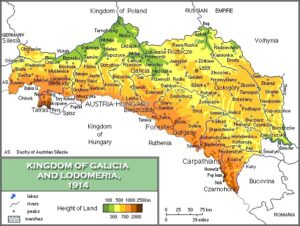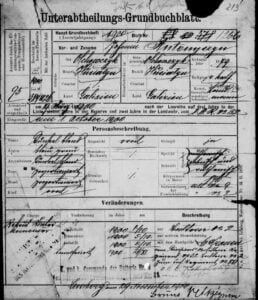The point of this brief post is to inspire and frustrate. Mostly inspire.
I have been working on a few research cases lately where the clients’ ancestors were from the historical region of Galicia – part of the Austrian Empire until the end of World War I, but today divided between the modern states of Poland and Ukraine. Research in Galicia, like so many European genealogical research areas, relies heavily on surviving vital and church records to document families. Sources are often difficult to locate, as the region switched hands often in the last 250 years or so. Regional archives in Poland, Ukraine, or Austria might hold collections that include your specific town, city, or village of focus.
Military records from Galicia (1865-1918) are today held by the Central State Historical Archives in Lviv, Ukraine. Starting in 1868, the Austrian Empire mandated that all able-bodied men serve in the military for a period of three years. As a result, the collection is massive. The records are loosely organized by the birth year and first letter of the surname. Digitized images of the records are available through the online catalog at FamilySearch.org, comprising 247 microfilm reels.[1]
The average personnel record found in the collection includes the name of the individual, where he was born, and a brief summary of his service and rank. Occasionally, the record will also include the names of the parents. Jumping around in the collection, the records are most often written in German and Polish, but with some Ukrainian records also included. In addition to records from Galicia, I have also found several records for individuals born in the region of Bukovina, a territory today divided between Ukraine and Romania.
The Austrian military was not segregated by religious group, so these records hold information for Protestant, Catholic, and Jewish men from Galicia. With many of the records of Galician Jewish communities no longer extant, military records have the potential to provide much-needed context and biographical detail. The catch, however, is that beyond their loose organization by surname, there is no unified index for the records. Locating a specific ancestor’s military record would be akin to finding the proverbial needle in a haystack.
In scouring the web, I have found very little written about this collection and nothing to suggest it is being lined up for a large-scale transcription project. What a help if it were…
Note
[1] “Military records, 1865-1930” Vienna (Austria). United Military Registration Office. FamilySearch. Records for letter “A” begin on microfilm FHL 2439871 with Item 1.
Share this:

About James Heffernan
James writes family histories for our Newbury Street Press imprint. He works closely with patrons to prepare meticulously researched volumes that match their family interests. James joined the staff of American Ancestors in 2015, working initially in Member Services, orienting visitors to our library campus in Boston, before spending several years as a genealogist preparing detailed reports for our Research and Library Services department. He is a frequent contributor to the Vita Brevis blog, the New England Historical and Genealogical Register, and American Ancestors magazine. His most recent work has focused on seventeenth-century New England immigrant origins, advancements in the field of genealogy, and strategies for connecting nineteenth and twentieth century immigrants to their birthplaces in Central and Eastern Europe. James works with our Education department to present lectures on American immigration history and research within the former territories of the Russian, German and Austrian Empires. Prior to his joining the team at American Ancestors, James worked in the conservation department of the John J. Burns library at Boston College, where he earned his BA, and the research library at Plimoth Patuxet Museums in Plymouth, Massachusetts.View all posts by James Heffernan →

